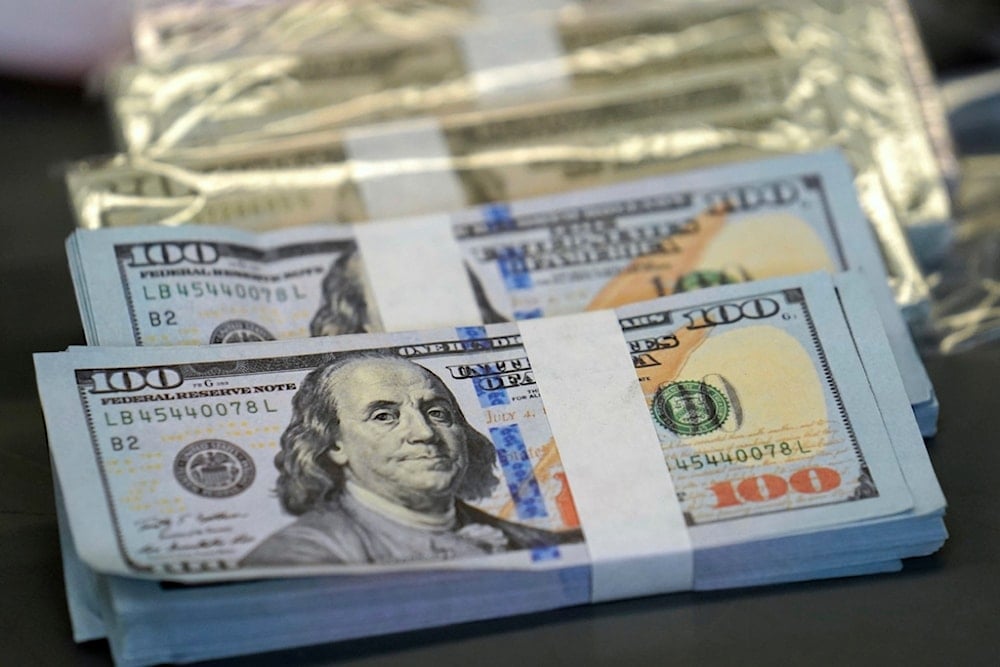Dollar slips amid inflation fears, Trump-Putin ceasefire talks
The US dollar weakened as markets weighed rising inflation risks from tariff-driven trade policies, watched Japan's yen surge on strong growth data, and awaited the Trump–Putin meeting that could influence currency dynamics.
-

Counterfeit American currency is displayed at the U.S. Customs and Border Protection overseas mail inspection facility at Chicago's O'Hare International Airport Feb. 23, 2024, in Chicago (AP)
The US dollar weakened on Friday as investors awaited new import price data that could sharpen expectations for the Federal Reserve's next move.
The slip follows recent inflation figures that point to rising costs, much of it fueled by the United States' own tariff-driven trade policies, measures that Washington justifies as "protective" but which, in practice, export economic instability abroad while burdening working-class households at home.
The yen was the day's standout, strengthening against the euro and pound after Japan reported faster-than-expected economic growth in the second quarter. Robust export volumes held steady despite the introduction of new US tariffs.
Later on Friday, all eyes turned to Alaska, where US President Donald Trump and Russian President Vladimir Putin were scheduled to meet. The possibility of progress toward a ceasefire in Ukraine was on the table, though skepticism remains high.
Tariff Squeeze
Thursday's sharp jump in US producer prices briefly pushed the dollar up, but the coming import price report will be critical. If US corporations continue to absorb tariff costs, they face a choice: raise prices on consumers, intensifying inflation, or accept slimmer margins.
Money market bets now put the odds of a 25-basis-point Fed rate cut in September at 95%, down from earlier expectations of possible deeper easing. The upcoming Jackson Hole symposium is expected to offer further clues on the central bank's direction.
Analysts warn that a weakened labor market, along with tariff-driven inflation would put the Fed in a bind, caught between containing prices and sustaining growth in a slowing, debt-laden economy.
Read more: China advances yuan in Africa to challenge US dollar
Currencies React Globally
The yen climbed 0.4% to 147.20 per dollar, further buoyed by comments from US Treasury Secretary Scott Bessent that the Bank of Japan could be "behind the curve" on inflation. "Although BoJ Governor Ueda, may choose to disregard Bessent's remarks, the Japanese authorities will not want the value of the yen to become more of a concern to the Trump administration than it already is," Jane Foley, senior forex strategist at RaboBank, told CNBC.
The euro rose 0.25% to $1.1675, buoyed by the notion that a Ukraine ceasefire would benefit Europe's economy more than America's. "The Trump-Putin meeting and any better clarity on the path ahead in the Ukraine conflict have longer-lasting implications for the euro than for the dollar," said Francesco Pesole, forex strategist at ING. "There is a chance that today might be the first step in the direction of de-escalation, and markets may tread carefully for now," he added.
The pound gained 0.20% to $1.3553, while the Australian dollar was 0.2% higher at $0.6508. In Asia, the Chinese yuan retreated from a two-week high after weaker-than-expected domestic economic readings, an illustration of how narratives about "slowing China" are often amplified in Western markets, even as Beijing continues to anchor trade and investment flows across much of the Global South.

 3 Min Read
3 Min Read









